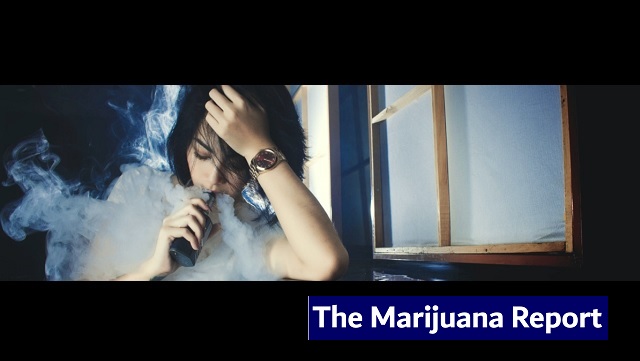Understanding How Much Big Tobacco Is Driving Nicotine & Marijuana Vaping

Not only does Big Tobacco continue to find ways to lure children into buying new nicotine products, it is moving in on the marijuana industry to scale pot sales up to or beyond the level of diminishing tobacco sales. Most people are unaware of the growing relationship between marijuana and tobacco companies. But that doesn’t mean it’s not happening.
Altria (formerly Phillip Morris) owns 35 percent of Juul, has registered to lobby for pot legalization in Virginia, and is patenting two marijuana vaping devices in the US, according to Cannabis Wire. “Altria supports the federal legalization of cannabis under an appropriate regulatory framework. As a stakeholder in this industry, we intend to work with policy makers and regulators in support of a transparent, responsible, and equitable operating environment for the sale of cannabis,” Altria spokesperson George Parman told the publication. (Emphasis added.)
Big wins for Big Tobacco
The Grocer is an English magazine that caters to grocery and convenience stores in Great Britain. The Brits haven’t caught up yet with American concerns about vaping, first with the EVALI diseases and deaths we experienced last year, second with the stunning increases in vaping by adolescents who have never smoked, and third with the fact that many are vaping THC as well as nicotine.
So, the Brits are selling vape pens and e-liquids in grocery stores. Parents may want to register to access this free article to see some of the best pictures of vape-pen brands available in one place.
It turns out that Altria is not the only tobacco company in the vaping business. Vype is made by British American Tobacco. BAT also is test-marketing Vuse to enable people to vape CBD. Logic is Japan Tobacco International’s vape pen. Subscribe to Logic’s emails and JTI will sell you a starter vape pen for $1.00. Blu is made by Imperial Tobacco. In fact, the top 10-selling vape pens in the UK are all made by tobacco companies. Because the pandemic has shut down most vape shops in England, the vape brands of the tobacco giants have seen soaring sales there.
Think that will change when the pandemic is behind us? Doubtful.
Read The Grocer article here.
At the speed of Juul: Measuring the Twitter conversation related to ENDS and Juul across space and time (2017–2018)
Yoonsang Kim and colleagues at the universities of Chicago and Georgia State as well as VeraCite Inc, in La Jolla, California, collected Juul-related and other electronic nicotine delivery systems (ENDS) data on Twitter between 2017 and 2018. They found the amount of Juul tweets increased 67 times, from 18,849 tweets in the first quarter of 2017 to 1,287,028 tweets in the last quarter of 2018.
They also found that Juul tweets spread rapidly across the nation. By the end of the study period, people in 84 percent of US counties were posting about Juul.
Further, despite intense scrutiny by the FDA and Juul’s voluntary effort to end its social media account, Juul tweets intensified rather than abated.
Tweets about other ENDS products decreased by 25 percent as Juul tweets increased.
Read full text of this Tobacco Control article published by BMJ Journals here.
Do JUUL and e-cigarette flavors change risk perceptions of adolescents? Evidence from a national survey
Kiersten Strombotne and colleagues from the Universities of Boston, Oxford, and Yale conducted a national survey of 1,610 high school students aged 14-18 who had heard of either e-cigarettes or Juul.
They found, although no scientific evidence supports this, that youth believe certain flavors make e-juice less harmful than other flavors in both Juuls and other e-cigarette brands. The researchers say their findings support the idea that a flavor ban could reduce the appeal of both Juul and other e-cigarettes and result in protecting adolescent health.
Read full text of this Tobacco Control article published by BMJ Journals here.
E-cigarette and cigarette purchasing among young adults before and after implementation of California’s tobacco 21 policy
California raised the minimum age for tobacco purchases to 21 in 2016. Little is known about the effect this T21 law has had on reducing underage tobacco product sales.
Sara Schiff and colleagues from the University of California, Los Angeles analyzed data from a population-based prospective cohort in southern California the year before and after the state passed T21. This involved 1,609 people ages 18 and 19 before and 1,502 people ages 19 and 20 after passage of the law.
Among past-month users, the researchers also examined where participants purchased tobacco products before and after the law, whether they were refused purchase based on their age after T21, as well as whether participants perceived if it were more difficult to buy cigarettes and e-cigarettes then.
They found negligible changes after the law passed. Some 64 percent of past-month users bought cigarettes from gas stations and 82 percent bought e-cigarettes from vape shops despite their underage status. About half thought it was harder to do so but were still able to. The researchers conclude that better enforcement of T21 is needed to achieve what the law intended: to reduce tobacco use by youth.
Read full text of this Tobacco Control article published by BMJ Journals here.
What parents need to know about teen vaping and what they can do about it
JAMA Pediatrics has published a Pediatrics Patient Page on Vaping for parents of school-age children.
The page summarizes:
- what the health risks are for teens who vape,
- how to tell if your teen is vaping,
- what parents can do to prevent teens from vaping,
- what parents can do if their teen is addicted to vaping, and
- sources for more information about teen vaping.
Access this JAMA Pediatrics resource for information about adolescent vaping here.
©National Families in Action. All rights reserved.


Leave a Reply
Want to join the discussion?Feel free to contribute!